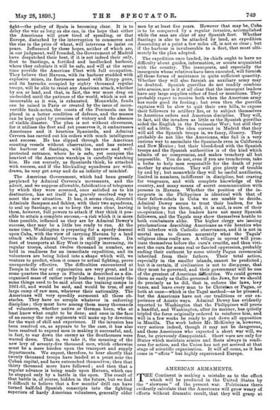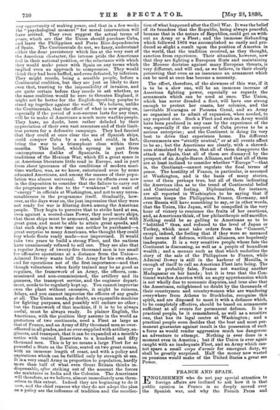AMERICAN ARMAMENTS. T HE Continent is making a mistake as to
the effect which will be produced in the United States by the " slowness " of the present war. Politicians there evidently calculate that the Americans will grow weary of efforts without dramatic result, that they will grasp at any opportunity of making peace, and that in a few weeks the "psychological moment" for moral intervention will have arrived. They even suggest the actual terms of peace, which are that the Union should purchase Cuba, and leave the Philippines and Porto Rico dependencies of Spain. The Continentals do not, we fancy, understand either the dour persistency which lies at the very root of the American character, the intense pride the Americans feel in their national position, or the reluctance with which they would make peace with Spain on any terms which implied even an approach to compromise. They would think they had been baffled, and even defeated, by inferiors. They might recede, being a sensible people, before a Continental coalition, but they are just as likely to dare even that, trusting to the impossibility of invasion, and are quite certain before they recede to ask whether, as the same coalition would be sure to threaten England, it might not be better for the English-speaking peoples to stand up together against the world. We believe, unlike the Continentals, that the effect of what is now going on, especially if the period of non-success lasts for any time, will be to make of Americans a much more warlike people. They have, no doubt, been rather deluded by their appreciation of their own vast resources and of their limit- less powers for a defensive campaign. They had fancied that they could at once clear the sea of Spanish ships, could conquer Cuba by a rush, and could, in fact, bring the war to a triumphant close within three months. This belief, which sprung in part from contemptuous dislike of Spaniards, in part from traditions of the Mexican War, which fill a great space in an American literature little read in Europe, and in part from sheer ignorance of the conditions of modern mari- time warfare, was, as we know, entertained even by some educated Americans, and among the masses of their popu- lation was almost universal. We see its effects even now in the disposition to consider that the failure to carry out the programme is due to the "weakness" and want of " energy" in officials at Washington, and not to any unrea- sonableness in the programme itself. Gradually, how- ever, as the days wear on, the just impression that they were not ready for war is filtering down among the American people. They begin to perceive that to strike hard at sea, even against a second-class Power, they need more ships, that these ships must be armoured, must be provided with great guns, and must be able to attain great speeds, and that such ships in war time can neither be purchased—a great surprise to many Americans, who thought they could buy whole fleets ready made—nor improvised. It would take two years to build a strong Fleet, and the nations have unanimously refused to sell one. They see also that a regular Army of twenty-five thousand men is too small for offensive operations at a distance from the Union— Admiral Dewey wants half the Army for his own share, and for operations not of the first importance—and that though volunteers when fairly trained may be as good as regulars, the framework of an Army, the officers, com- missioned and non-commissioned, the artillery and its gunners, the transport service, and the engineer depart- ment, needs to be regularly kept up. You cannot improvise even the plant without excessive, it might be ruinous, delays, and you cannot improvise the officers of any grade at all. The Union needs, no doubt, an expansible machine for fighting purposes, and possibly will endure no other ; but the framework of that machine, if it is to be always useful, must be always ready. In plainer English, the Americans, with the position they assume in the world as protectors of two continents, need a Fleet as large as that of France, and an Army of fifty thousand men so over- officered in all grades, and so over-supplied with artillery, en- gineers, and transport, that it can be expanded at a month's notice with trained Reservists to a hundred and fifty thousand men. This is by no means 'a large Fleet for so powerful a State as the Union, seated on two great oceans, with an immense length of coast, and with a policy and aspirations which can be fulfilled only by strength at sea. It is a very small Army in proportion to population, hardly more than half of what even Great Britain thinks in- dispensable, after striking out of the account the forces she maintains in India and the Colonies. The Americans will therefore, as we believe, almost immediately arm them- selves to this extent. Indeed they are beginning to do it now, and the chief reasons why they do not adopt the plan as a policy are the influence of tradition and the recollec- tion of what happened after the Civil War. It was the belief of its founders that the Republic, being always peaceful, because that is the nature of Republics, could get on with- out an Army or a Fleet ; and the immense disbanding which followed 1864 was accomplished so easily and pro- duced so slight a result upon the position of America in the world, that the tradition received, as they thought, sanction from experience. Their situation, however, now that they are fighting a European State and maintaining the Monroe doctrine against many European threats, is very different, and will end, as we believe, in their clearly perceiving that even as an insurance an armament which can be used at once has become a necessity.
The effect, therefore, of the slowness of this war, if it is to be a slow one, will be an immense increase of American fighting power, especially as regards the armaments which can be used at once. The Union, which has never dreaded a fleet, will have one strong enough to protect her coasts, her colonies, and the inevitable Nicaragua or Panama Canal, and an Army so organised as to admit of expansion, when needed, to any required size. Such a Fleet and such an Army would have been produced in any case by the experience of the war, especially if the conquest of Cuba proves to be a serious enterprise ; and the Continent is doing its very best to drive that experience home. Its different Governments are "strictly neutral," or at all events affect to be so ; but the Americans see clearly, with a shrewd- ness stimulated by alarm, that all of them disapprove the attack on Spain, that all of them are dismayed by the prospect of an Anglo-Saxon Alliance, and that all of them are at least inclined to consider whether "Europe "—that is, the Continent—cannot regulate the final terms of peace. The hostility of France, in particular, is assumed at Washington, and is the basis of many stories, none of them perhaps true, but all of them indicating the American idea as to the trend of Continental belief and Continental feeling. Diplomatists, for instance, are all reported in Washington to be saying that if America keeps the Philippines, France, Germany, and even Russia will have something to say, or in other words, that the Union, like Japan, will be compelled in the very hour of victory to renounce the fruits of her exertions, and, as Americans think, of her philanthropic self-sacrifice. Nothing could be so galling to Americans as to be " belittled " thus, and reduced to the level of Japan or Turkey, which must take orders from the "Concert," except, indeed, the feeling that if they were so menaced their means of defence, without alliances, are hopelessly inadequate. It is a very sensitive people whose fate the Continent is discussing, as well as a people of boundless wealth ; and a menace such as that which underlies the story of the sale of the Philippines to France, while Admiral Dewey is still in the harbour of Manilla, is enough of itself to call an American Fleet into being. The story is probably false, France not wanting another Madagascar on her hands ; but it is true that the Con- tinent watches America with an angry apprehension which is not wholly due to economic disputes, and true also that the Americans, enlightened no doubt by the thousands of their countrymen and countrywomen who are wandering everywhere from Athens to Stockholm, recognise this spirit., and are disposed to meet it with a defiance which, to be completely effective, should be based on armaments sufficient at all events for permanent defence. It is a practical people, be it remembered, as well as a sensitive one, that has its legal centre at Washington ; and a practical people soon decides that the best and most per- manent guarantee against insult is the possession of such a force as would render aggression much too dangerouE an adventure to attempt. Nothing is ever done in a moment even in America ; but if the Union is ever again caught with an inadequate Fleet, and an Army which can- not spare a small corps d' armee for emergent duty, we shall be greatly surprised. Half the money now wasted on pensions would make of the United States a great sea Power.



































 Previous page
Previous page